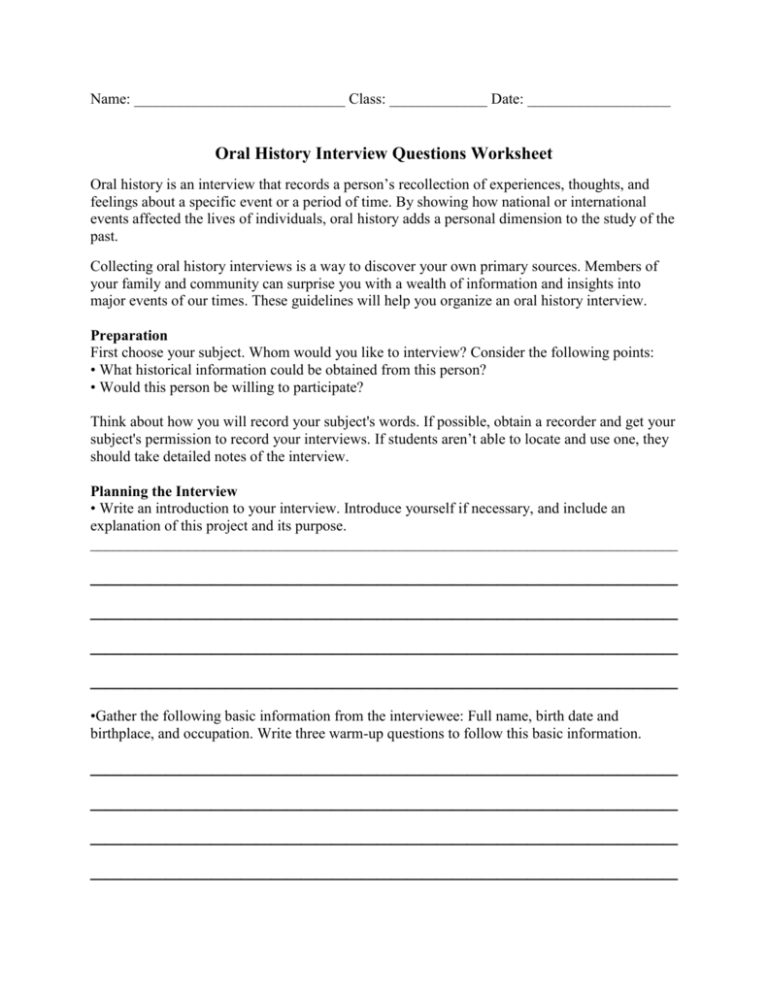
Name: ____________________________ Class: _____________ Date: ___________________
Oral History Interview Questions Worksheet
Oral history is an interview that records a person’s recollection of experiences, thoughts, and
feelings about a specific event or a period of time. By showing how national or international
events affected the lives of individuals, oral history adds a personal dimension to the study of the
past.
Collecting oral history interviews is a way to discover your own primary sources. Members of
your family and community can surprise you with a wealth of information and insights into
major events of our times. These guidelines will help you organize an oral history interview.
Preparation
First choose your subject. Whom would you like to interview? Consider the following points:
• What historical information could be obtained from this person?
• Would this person be willing to participate?
Think about how you will record your subject's words. If possible, obtain a recorder and get your
subject's permission to record your interviews. If students aren’t able to locate and use one, they
should take detailed notes of the interview.
Planning the Interview
• Write an introduction to your interview. Introduce yourself if necessary, and include an
explanation of this project and its purpose.
______________________________________________________________________________
_______________________________________
_______________________________________
_______________________________________
_______________________________________
•Gather the following basic information from the interviewee: Full name, birth date and
birthplace, and occupation. Write three warm-up questions to follow this basic information.
_______________________________________
_______________________________________
_______________________________________
_______________________________________
• Write at least six questions to help you get stories and details about the event or time period
you are studying.
_______________________________________
_______________________________________
_______________________________________
_______________________________________
_______________________________________
_______________________________________
_______________________________________
_______________________________________
_______________________________________
• Prepare some follow-up questions. These questions should help you to clarify and expand upon
the information from your interview.
_______________________________________
_______________________________________
_______________________________________
_______________________________________
_______________________________________
Conducting the Interview
• Make an appointment with your subject and be on time.
• Explain to your subject that you will be using the information for a class project.
• If you record the interview, be sure your subject agrees to it.
• Bring along your notes to help you guide the interview. Your subject may wander off with an
interesting story. Continue with it as long as it adds to your understanding of the topic. If it does
not, politely return to your list of questions.
• When your interview is finished,
• Be sure to write your subject a thank-you letter.
Copyright © by Holt, Rinehart and Winston. All rights reserved.
INTERVIEW RELEASE FORM
Project name:
______________________________________________________________________________
Date:________________________________________
Interviewer:
______________________________________________________________________________
Tape number:________________________________________
Name of person(s) interviewed:
______________________________________________________________________________
Address:
______________________________________________________________________________
Telephone number:________________________________________
Date of birth:________________________________________
By signing the form below, you give your permission for any tapes and/or photographs made
during this project to be used by researchers and the public for educational purposes including
publications, exhibitions, World Wide Web, and presentations.
By giving your permission, you do not give up any copyright or performance rights that you may
hold.
I agree to the uses of these materials described above, except for any restrictions, noted below.
Name (please print):
______________________________________________________________________________
Signature:
______________________________________________________________________________
Date:________________________________________
Researcher’s signature:
______________________________________________________________________________
Date:________________________________________
Restriction description:
______________________________________________________________________________
Tips for Oral History Interviews
An interview is not a conversation. The whole point of the interview is to get the narrator to
tell his or her story. Limit your own remarks to a few pleasantries to break the ice, then brief
questions.
Ask open-ended questions, ones that require more of an answer than "yes" or "no." Start with
"why," "how," "where," "what kind of. . ."
Ask one question at a time.
Ask brief, understandable, and clear questions.
Start with questions that are not controversial; save the sensitive questions, if there are any,
until you have become better acquainted. A good place to begin is with the narrator's youth
and background.
Don't let periods of silence fluster you. Give your narrator a chance to think of what he or she
wants to add before you hustle him or her along with the next question.
Don't interrupt a good story because you have thought of a question, or because your narrator
is straying from the planned outline. If the information is pertinent, let him or her go on, but jot
down your questions on your notepad so you will remember to ask it later. Be willing to let the
interview wander – but if you’re not getting interesting material, put it back on track with a
question.
Be accurate: After the interview, confirm the spelling of names or places used by the subject.
Write the spellings in your notebook.
Be respectful.
Try to establish at every important point in the story where the narrator was or what her role
was in this event. Like, “Where were you when you heard about the bombing of Pearl
Harbor?” It is important to ask about their perception of these events: “How did hearing about
this event affect you?” or “What did you think this event meant?”
End the interview at a reasonable time.
Thank the person you interviewed. You might even wish to send them a note or a copy of your
final report.
Taken in part from From Willa K. Baum, Oral History for the Local Historical Society. See:
http://bancroft.berkeley.edu/ROHO/resources/rohotips.html







